SUMMARY
This is AI generated summarization, which may have errors. For context, always refer to the full article.
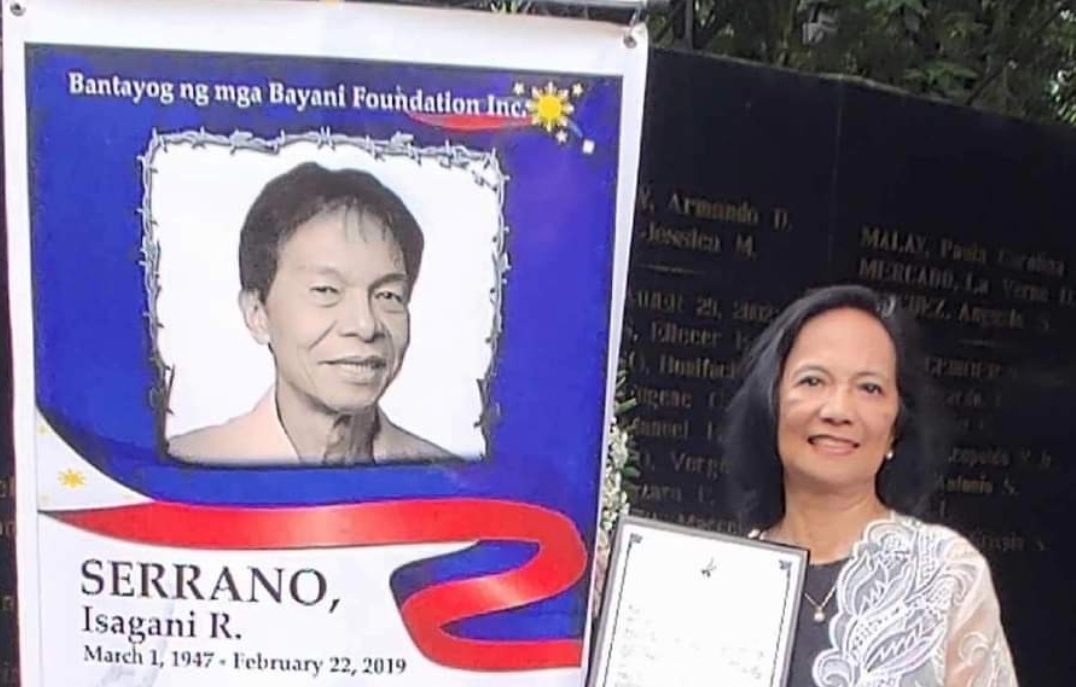
My tukayo (namesake), Isagani Serrano, must be smiling somewhere in the cosmos.
How fitting that Gani was recognized by the Bantayog ng mga Bayani Foundation on Thursday, November 30, also day one of the 28th Conference of the Parties (COP28) being held in Dubai, United Arab Emirates.
Gani was a fixture representing civil society not just in many of the COPs, but also in other UN conferences in fields such as population and development, social issues, and habitat.
If he were still alive today, Gani would likely be involved in COP28, pushing for solutions to the Philippines’ climate crisis. Whatever gains the world gets from COP28, there’s a bit of Gani in those advances. He participated in so many regional and global conferences but felt the slow progress in many of the worthy causes.
As he said in 2013, “I’ve been through conferences after conferences where we would discuss poverty while enjoying the amenities of 5-star hotels, as World Bank people usually do. If only the number of meetings could win us a revolution we’ve had more than enough.”
Gani, however, never lost hope. “Citizens have placed their own perspective in the global agenda,” he wrote back in 1994. “They are exercising their public responsibility to keep the hands and feet of states and markets in the fire of reform even as they strive to better their lot on their own…..Surely humanity, though in trouble, has good reasons to be hopeful.”
Boy and Gani
I first met my tukayo back in 1998 when I had a side writing job with the Department of Agrarian Reform. The agency was then led by the late Horacio “Boy” Morales Jr., during the Estrada administration.
It was the second time after 1986 that leaders of the more than 70-year-old non-government organization (NGO) Philippine Rural Reconstruction Movement (PRRM) had taken on the task of managing key government agencies: Boy was with DAR, and another PRRM stalwart, Edicio “Ed” dela Torre, headed the Technical Education and Skills Development Authority. The first was when another former PRRM president, the beloved Dr. Juan Flavier, took on the helm of the Department of Health from 1992 to 1995 during the Ramos administration, and made a big difference.
Boy and Gani were the best of friends, aside from Ed, of course. Bonded by their years in the underground movement and incarceration during Martial Law, they would rise to become leaders of civil society post-1986, engaging government and the business community in much-needed reforms.
Boy died after a massive heart attack in 2012, seven years earlier than Gani. Boy was recognized by the Bantayog ng mga Bayani Foundation three years after he passed away.
Boy was the more famous of the two, as he had actually been part of the first Marcos administration. He was one of the “bright boys” associated with a Marcos Sr. technocrat, Rafael Salas, only to secretly join the underground movement three years after the declaration of martial law when he was with the public think-tank Development Academy of the Philippines. And Boy unforgettably made it official when, instead of getting his award as one of the Ten Outstanding Young Men of the Philippines (TOYM) of the Philippine Jaycees in 1977, a letter was read announcing that he had defected to the communist movement.
But Boy wouldn’t be Boy without Gani. Post-1986, Gani was among the great minds whom Boy relied on, while Boy, given his diverse connections with people in the first Marcos administration, activists (all sorts), the UP Vanguard, Beta Sigma Fraternity, among many others, was often the implementer and the one up front in engagements with government and the business community.
Whenever Boy wanted a speech that had something to do with sustainable development, he asked me to talk with Gani. And Gani was never without any ideas for a speech, especially on the causes he loved: sustainable development, climate justice, sustainable agriculture, elimination of hunger, agrarian reform, and civic engagement.
“What we do today, in our homes, in our community, anywhere, will eventually tell on the kind of future we want to build. It’s our responsibility to do something as best we can. Nature can very well take care of itself, as it probably knows better. It’s us who needs saving.”
– Isagani serrano
Many of his ideas were profound, for they contained Gani’s wealth of experiences working in the underground, in PRRM and other NGOs, his international engagements, as well as his conversations with his life partner, Lisa Dacanay, an expert on social enterprises.
A ‘Marxist-Lennonist’
The soft-spoken Gani was also a prolific writer, a poet, and played the guitar. And, as Ed quipped in a tribute to him in 2019, while Gani and Boy were both well-rounded, the former had a wider and deeper knowledge than Boy since he also went “cosmic.”
They were active in CIVICUS, a global alliance of civil society groups dedicated to pushing citizen action worldwide. For a speech I was working on, Gani shared with me an essay he wrote for this organization, which can also be described as his own manifesto.
His article, “Coming Apart, Coming Together: Globalization and Civil Society,” written in March 1999, reflected his Marxist-Lennonist (not a typo) philosophy, he being a fan of the Beatles singer-songwriter, John Lennon.
“The day will come when every village, town, city and country on this planet will be safer, healthier, more egalitarian, more sustainable. These villages, towns, cities and countries shall become models of sharing and caring, of equal opportunity and inclusive participation, of a kind of living that is worthy of human dignity and is attuned to nature’s limits. People, goods, ideas shall be free to move anywhere. No hell below us, above us only skies. Though we may still be different people of different colors believing, thinking, doing different things, this diversity merely gives richness to our lives; these dividing lines don’t exist as in when we are telescoping our planet from outer space. Come that day, the world will live as one,” he wrote.
His favorite song, Lennon’s Imagine, had a big impact on Gani, and it would become a piece of music associated with him.
“I’ve been called ‘Marxist-Lenonnist,’ maybe because I always play John Lennon’s Imagine which I compare to the communist anthem Internationale. I always imagine a world of fairness, a world shared by everyone. I hate to see poverty and oppression, the sight triggers the rebel in me. There may be improvements in our lives yet the present that I see is far from what I dreamed of when I first plunged into activism. It is not the future we said we want to build during the 1992 UN Earth Summit in Rio. It’s as if nothing’s changed. We probably won’t see the end of poverty in our generation. And for me that’s reason enough to continue the movement,” he said in a speech at a high school reunion in 2013.
Understandably, the Bantayog ng mga Bayani Foundation’s citation for Gani focuses on his life as an anti-Marcos activist, including his 7-year incarceration from 1973 to 1975 and 1982 to 1986. Gani was freed along with Boy, Ed and other political prisoners after the “people power” revolution.
But the citation doesn’t quite capture Gani’s over three decades of contributions to reforming Philippine society after the fall of the dictatorship. He pushed for popular democracy, climate justice, sustainable development, among other causes. He co-founded at least 16 civil society organizations such as Social Watch Philippines, Earth Day Network Philippines, Philippine Movement for Climate Justice, NGO Forum on the ADB, Philippine Greens, Go Organic.
For writers like myself, his books, poems, and essays which reflected his mantra – “Justice and fairness in a fragile world” – comprise a rich source of learnings about our country, especially as we face a world that still needs a lot of reforming.
I’m glad to see that his partner Lisa, who I first met in UP when she headed the student organization, SAMASA, has been undertaking initiatives that share the life and work of Gani, such as putting up RISe, Remembering Isagani SErrano, a website in his honor, and for successfully pushing for his inclusion in the Bantayog ng Mga Bayani. The website includes his essays, poems, as well as tributes and videos about Gani.
The Philippines certainly needs heroes who can move people, young and old, into becoming civics or good citizens.
In explaining the need for this, Gani said the world will not become a better place if citizens leave everything to the state (prince) and business (merchant).
“The prince and the merchant have a place in creating a civic world. But they cannot continue to dominate and run things the way they did in the past. Change they must, and in ways that are worthy of the citizens of a new world. They have the means and the institutions which if reformed can enable a faster, less bloody and more civilized transition to a civic world,” said in his Coming Apart, Coming Together essay.
In calling on people to step up as civics, Gani said: “These new citizens are yesterday’s and today’s alternative voices celebrating and shaping the coming new age through their songs and poetry, through voluntary association and communal living, through caring and sharing for each other. They are the derring-do’s who lay their lives on the line to bring down dictators and corrupt governments, to stop companies from further hurting our already degraded environment. They are the leading social activists challenging distant and highly centralized institutions of power in order to restore sovereignty in the hands of ordinary people….
“With these modern or post-modern citizens, we have a fighting chance to do a radical turnaround. With them, we will be able to learn faster to live together, to come together before the wrecking ball succeeds in tearing our world apart.”
Although Gani was tall by Philippine standards and never became a “prince,” he reminds me of French author Antoine de Saint-Exupéry’s The Little Prince, which, as the official website on the book says, has since become an “icon of sustainable development, a promoter of world peace, and an advocate of children’s rights.”

Gani died of cancer in February 22, 2019, a week shy of his 72 birthday. He was cremated and his ashes placed in his farm house in Samal, Bataan. The house is another symbol that Gani was not all talk about his advocacies. It’s where the Samaleño Organiko Producers Cooperative, which promotes organic agriculture, was born in partnership with PRRM and the Department of Agriculture. Lisa now hopes to make it an “agri-ecotourism destination showcasing sustainability.”
Six years before he died, Gani already knew how he would want people to remember him. He said in his high school reunion speech: “Someone said, in somewhat macho fashion, that you’re a made man if you have sired a son, planted a tree, and written a book. By that measure, I’m made. But what do I really want others to say when I’ve departed? From Marcos types: ‘He was a real pain in the ass.’ From friends who know me better: ‘Gani may be a pain in the ass, but he truly and deeply cared for the blood of others.’” – Rappler.com
ALSO ON RAPPLER
- Juan M. Flavier: The Filipino health hero
- Rappler’s Maria Ressa makes history, receives Nobel Peace Prize in Oslo
- Who is Rafael M. Salas? Selling the millennial man to the millennials
- Decades later, Yoko Ono to be credited on ‘Imagine’
- COP28 kicks off with climate disaster fund victory
- This place in Metro Manila takes you on a gripping Martial Law tour
Add a comment
How does this make you feel?

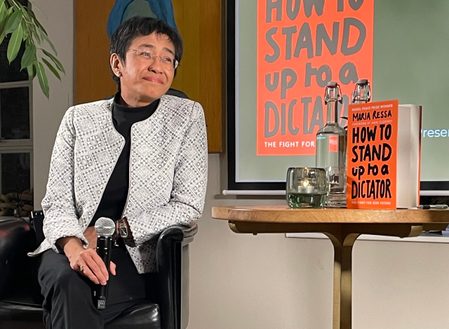

![[OPINION] Hoping amidst ‘this thing’: COP28 reflections from a 24-year-old first-timer](https://www.rappler.com/tachyon/2024/01/imho-c0-28-reflection.jpg?resize=257%2C257&crop=297px%2C0px%2C720px%2C720px)

![[OPINION] Is limiting warming to 1.5°C still alive after COP28?](https://www.rappler.com/tachyon/2023/12/imho-cop28.png?resize=257%2C257&crop=285px%2C0px%2C720px%2C720px)
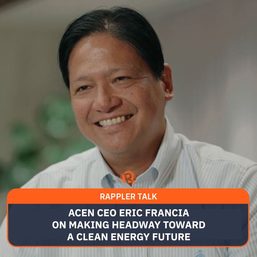




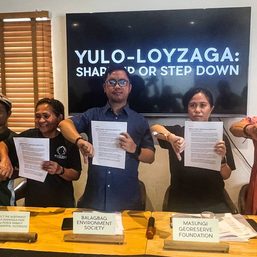
![[Newspoint] A fighting presence](https://www.rappler.com/tachyon/2024/07/thought-leaders-a-fighting-presence.jpg?resize=257%2C257&crop=441px%2C0px%2C1080px%2C1080px)
![[Closer Look] ‘Join Marcos, avert Duterte’ and the danger of expediency](https://www.rappler.com/tachyon/2024/06/TL-trillanes-duterte-expediency-june-29-2024.jpg?resize=257%2C257&crop_strategy=attention)

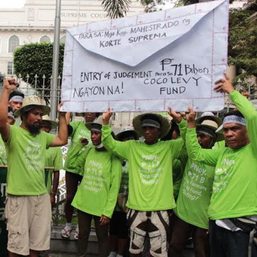

There are no comments yet. Add your comment to start the conversation.